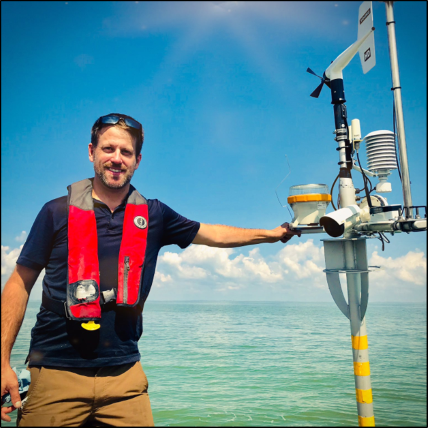
- This event has passed.
06/18/24: Ed Verhamme

Please join us for a Great Lakes Seminar Series – subscribe!
Time: 11:00-12:00 pm EDT
Location: NOAA Great Lakes Environmental Research Laboratory, Lake Superior Hall and Virtual
Presenter: Ed Verhamme, Principal and Senior Engineer at LimnoTech and President of Freeboard Technology
Title: Applying New Technology at a Great (Lake) Scale: What are We Waiting for?
About the presentation: Despite the ubiquity of modern electronics in our pockets, cars, and buildings, there’s still relatively few sensors deployed in the natural environment, including the watersheds, nearshore areas and open waters of the Great Lakes. Why is that? This seminar will examine a few case studies where the number of sensors has scaled quickly and where progress has stalled. Technological advancements have helped to increase sensor reliability and lower costs (both capital and operation), but catastrophic events are still the main catalyzing force driving rapid change in the region. Examples include the sinking of the Edmund Fitzgerald, large hurricanes, and more recently the Toledo Water Crisis. These events have been the nucleation point that has driven the deployment and ongoing operation of over 100 operational sensors on the Great Lakes. However, these investments pale in comparison to the rapid adoption of sensors in other public sectors including transportation (traffic), energy (smart grid), and even terrestrial weather. Government funding after each disaster helped rapidly advance new sensor networks, however, ongoing expansion and operation of similar sensors has fallen on a mix of federal, state, and local sources of funding. However, there are some exceptions including the use of technology within fisheries management, which is accelerating adoption of several low and high-tech sensor networks. A myriad of agencies and commercial companies all play a role in coordinating, funding, and maintaining sensors networks in these public spaces. Identification of mismatches between investments (either in the public or private sector) in monitoring and public health or shear economic value are easy targets for expansion. While deploying and maintaining sensors offshore is challenging, there’s many opportunities to grow watershed, shoreline, and mobile asset monitoring. Careful attention needs to be paid to the means of funding (public) or monetization (private), and how to incentivize, rather than mandate, the expansion of sensor networks that reduce risk (health or financial) and improve our understanding of the largest freshwater ecosystem on the planet.
About the speaker: Ed Verhamme is a Principal and Senior Engineer at LimnoTech and was recently named president of Freeboard Technology, a new water technology start-up he co-founded as a subsidiary of LimnoTech. Ed is well known for his work across the Great Lakes region and other key lakes in the United States to design, build, and maintain the next generation sensing network that supports hundreds of thousands of boaters, key water managers, and critical infrastructure owners. He holds a M.S. and B.S in Environmental Engineering from Michigan Technological University, where he first applied models and advanced sensors to study the depths of Lake Superior and has since studied portions of every Great Lakes. Drinking water treatment plants, coastal communities, and the research community rely on Ed’s expertise to monitor and model hazardous weather, toxic and harmful algal blooms, hypoxic waters, and critical shoreline and wetland habitats. He has also served as a principal investigator on several major federally funded research projects and has contributed to nearly twenty peer-reviewed journal articles and mentored a dozen master’s and PhD students. In 2021, Ed served as president of the International Association for Great Lakes Research and in 2023 received its highest service award, the Anderson-Everett Award. Ed works at LimnoTech’s office in Ann Arbor, Michigan.
**Registration is not required**
_____________________________________________________
IMPORTANT VISITOR INFORMATION
All seminar attendees are required to receive a visitor badge from the front desk at the NOAA Great Lakes Environmental Research Laboratory facility. Attendees need to present a valid U.S. photo ID or green card. If you are a Foreign National, we encourage you to attend virtually. For questions regarding building access, please email Margaret Throckmorton at [email protected]. Additional questions? Contact Margaret Throckmorton: [email protected]; visit ciglr.seas.umich.edu for more information.

